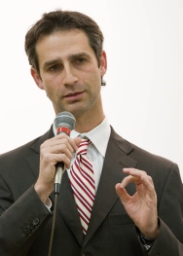The recent conflict in Gaza wasn’t a war between Israelis and Palestinians, nor between Israelis and Arabs, but a clash of civilizations pitting Israel against Iran and extremist groups supported by the Islamic state, an Israeli official said in a Jan. 28 talk on campus.
Echoing the “clash of civilizations” thesis of the late Harvard political scientist Samuel Huntington, Jacob Dayan, Israel’s consul general for

the southwest region of the United States, said the nature of confrontation these days is no longer between nation states but between nations and non-state actors – mainly terrorist organizations.
At a well-attended political briefing at the UCLA School of Law, Dayan described the changing nature of warfare as the first of three major challenges the world faces on the geostrategic level. His talk, titled “Current Challenges in the Middle East Facing the New Administration” of President Barack Obama, was sponsored by the Israel Studies Program and the International Institute.
The second geopolitical challenge, said Dayan, is that terrorist groups in the Middle East and beyond “share the same ideology – Islamic fundamentalism – and what we see today is a very dangerous trend … whether it’s in Mumbai, whether it’s in Bali, Indonesia, or in New York.”

Emphasizing that Hamas is widely seen as a terrorist organization, Dayan said it “took hostage not only the lives of 1 million Israelis in the southern part of Israel, but also took hostage the lives of so many Palestinians in Gaza.”
In the last eight years, Hamas has fired more than 8,000 rockets into Israel, and one of the tactical goals of Israel’s Gaza offensive was to deter those attacks, Dayan said. “The fact that kids can go again to schools – that’s a victory by itself.”
Another tactical goal of the Israelis was to destroy “the one industry in which Hamas has invested heavily in the last few years – the missile industry,” Dayan said, adding that Hamas has spent a lot of money “buying weapons from Iran instead of investing it in infrastructure and bettering the lives of Palestinians in Gaza to show that they are a viable government there.”
To press home his point about Hamas’ ineffectual governance, Dayan recounted a 2005 proposal by James Wolfensohn, then president of the World Bank, during Israel’s withdrawal from Gaza.
“You have cutting-edge greenhouse technology and are exporting flowers by the millions all over the world,” Wolfensohn told Israel’s foreign minister at the time, according to Dayan. “I want you to leave those greenhouses in Gaza, and, as a token of goodwill, I am willing to put $500,000 from my own pocket” so that Palestinians in Gaza can utilize the greenhouses.”
The Israeli government agreed to leave behind the greenhouses – without Wolfensohn’s money, but the former World Bank president insisted on offering it “as a statement to the Palestinians and the Israelis that (Gaza) can be a different place, a better place,” Dayan said, adding: “Do you know what happened? It took them (Hamas) seven days to destroy the greenhouses.”
Israel’s 2006 battle with Hezbollah militants in Lebanon makes the Gaza conflict the second and latest war between Israel and Iran, Dayan

Behind the scenes during the Gaza conflict, Dayan explained, “many Arab leaders came to us and said, ‘We have a common interest -we don’t want to see Hamas, this terrorist organization, winning this battle.’” Particularly for moderate Arab nations, “it was crucial that this round (in Gaza) be a decisive round for Israel … and that is the only context in which we have to see this operation – as a war between moderates and radicals in the region,” Dayan said.
In fact, added the consul general, everyone who supports Mideast peace and the efforts by the Obama administration to resolve the Israeli-Palestinian dispute should be aware of the importance of “isolating the radicals in the region and defeating them.”
http://today.ucla.edu/portal/ut/israeli-official-says-gaza-conflict-80011.aspx





